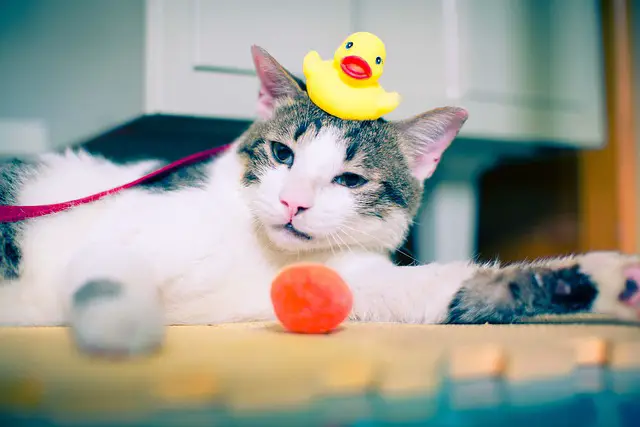Can I use human shampoo on my cat?
I did and regretted soon after. My cat’s coat wasn’t the same again.
I learned the hard way and I hope this post will help people avoid the same mistake.
You should not never use human shampoo to bathe your cat. Human shampoos are not good for a cat’s delicate skin and fur.
Read on to find out 7 reasons why the answer to the question – Can I use human shampoo on my cat? – is No.
I will also tell you what you can use instead of cat shampoo, in case you have run out.
Can I Use Human Shampoo on My Cat? 7 Reasons Why Human Shampoos are Harmful for Cats
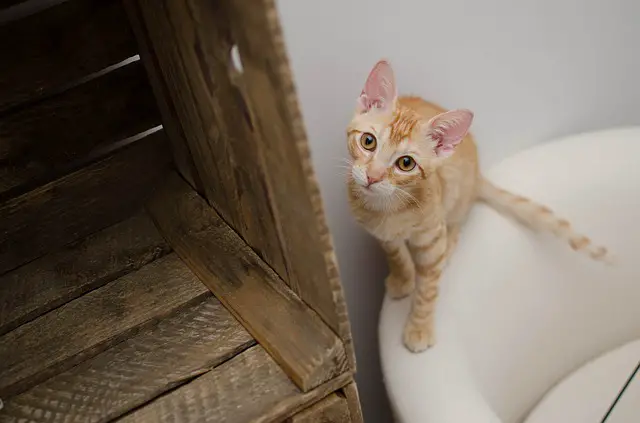
Human shampoos aren’t toxic. Some of the herbal ones are also mild and won’t kill your cat.
However, despite these reasons, you should never use human shampoo (or even dog shampoo) for bathing your cat because of the following reasons:
1. Difference in pH values of human and cat’s skin
PH stands for potential of hydrogen. It is, to explain simply, the value that denotes the acidity or alkalinity of a solution. Even human and cat skin have a pH value.
Human skin pH has a range between 4 and 6, while cat skin pH is in between 6.4 and 6.9 with male cats having higher pH values than females.
Human shampoos are specially formulated to clean human skin and have a different pH compared to that of cat shampoos.
2. Human shampoos are formulated with surfactants
Most human shampoos are made with surfactants. Surfactants like sulfates are what help create suds and lather in shampoos and also remove dirt, oil, and grime from the hair.
However, these surfactants can be very harsh on a cat’s skin and coat. They unnecessarily strip off the oil and lipid layers from your cat’s skin causing intense dryness.
That is the main reason why you should not use human shampoo on your cat.
3. Human shampoos have other harsh ingredients too
In addition to surfactants like Sodium Lauryl Sulfate, human shampoos also contain dyes/colors, harsh essential oils, fragrances, and parabens.
These can also be rather harsh and drying on your cat’s skin and could lead to irritation and intense itchiness on your delicate pet’s skin.
4. Human shampoos can cause many skin problems in cats
In addition to drying out your cat’s skin, human shampoos – no matter how mild they claim to be – might cause many skin problems in your cat.
Many cats that are regularly bathed using human shampoos end up suffering from itchy, flaky skin, dandruff, dryness, severe hair loss, etc.
5. They aren’t tear-free
Kittens can greatly suffer from human shampoos because these can get into their eyes causing tears, redness, pain, and inflammation.
That is why you must never use human shampoo to bathe your young kitten.
6. They are harmful if ingested
Young kittens and weak/older cats could get terribly sick if they ingest human shampoo accidentally.
A friend’s cat licked some leftover human shampoo from their bathroom floor and had to be rushed to the vet. He experienced severe vomiting and had to be given fluids intravenously for a few hours to prevent dehydration.
Please take care not to leave human shampoo accessible to young cats.
7. Special cat breeds definitely need cat shampoos
And then there are those special gorgeous cat breeds like Persian cats and Maine Coons – they definitely need specially formulated gentle cat shampoos for bathing their glorious coats.
Even a one-time-use of human shampoo on these special breeds can permanently ruin their gorgeous fur. So- never make the mistake of using human shampoo on these cats.
What is the Difference between Human Shampoo and Cat Shampoo?
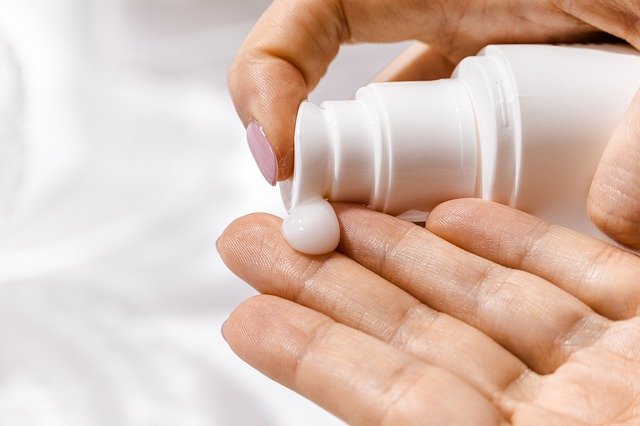
All shampoos are designed to cleanse a specific skin-type. Cats have different skin and coat types compared to human hair and scalp.
That is why, our shampoos are not designed for our four-legged feline friend. Here are the differences between human and cat shampoos:
A. They have different ingredients
Cat shampoos have different ingredients formulated specially for cleaning cat hair. You can also have different types of cat shampoos such as medicated shampoo, flea shampoo, etc.
Mostly, cat shampoos contain lactic acid, glycerin, colloidal oatmeal, aloe vera, coconut oil, shea butter, and hydrocortisone, etc. They might also be fortified with almond oil to give your cat a shinier coat.
Human shampoos, on the other hand, contain surfactants like SLS (sodium laureth sulfate or sodium lauryl sulfate), parabens (methylparaben), dyes, fragrances, essential oils like tea tree oil, etc.
Prolonged use of human shampoo on cat’s fur can be very damaging to your cat’s skin and could even cause irreversible damage in some cases – especially in long-haired cats like Persians, etc.
B. Different pH levels
Cat’s skin and human skin pH values are very different.
Cat shampoo is balanced for cat’s skin pH while a human shampoo is very acidic for maintaining the skin’s acidic mantle. Cheap human shampoos tend to be even more acidic and can have a stripping effect on your cat’s coat.
Such shampoos strip off all the protective barrier of your cat’s coat making it very dry, itchy, and vulnerable to the weather elements.
C. Designed for different skin thickness
Human skin is a lot thicker than feline skin which is more delicate and thin. In fact, human skin is almost 2 to 3 times thicker than a cat’s skin.
Human shampoos designed for this thickness can be too harsh on a cat’s delicate skin and could wreak a lot of damage upon it.
What are the Benefits of Using a Cat Shampoo to Cleanse Your Cat?
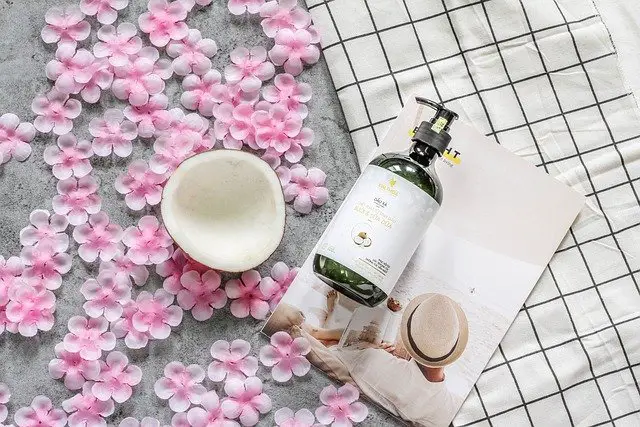
A high-quality cat shampoo can have the following benefits on your cat’s skin:
1. Cleans and softens
Top-rated cat shampoos not only clean your cat’s skin and fur, they also soften it. Many high-quality cat shampoos contain natural ingredients that boost the softness of your cat’s fur and also impart a natural shine to it.
2. They are hypoallergenic
Hypoallergenic shampoo for cats cleanses, conditions, and moisturizes your cat’s skin and coat without causing any adverse allergic reactions such as itchy skin, scaling, dryness, irritation, etc.
3. Are vet-approved and free from chemicals
Many cat shampoos are formulated under the guidance of veterinary experts and are devoid of harsh chemicals, colors, dyes, fragrances, parabens, and sulfates.
4. They are suitable for all cat breeds and ages
Many shampoos for cats are also mild, pH-balanced, and suitable for all cat breeds as well as for adult cats and kittens.
5. Can help with specific issues and skin condition
Many cat shampoos are specially formulated to eliminate fleas and ticks, shedding, itchy skin, dander, dandruff, etc.
Safe & Effective Alternatives to Cat Shampoo
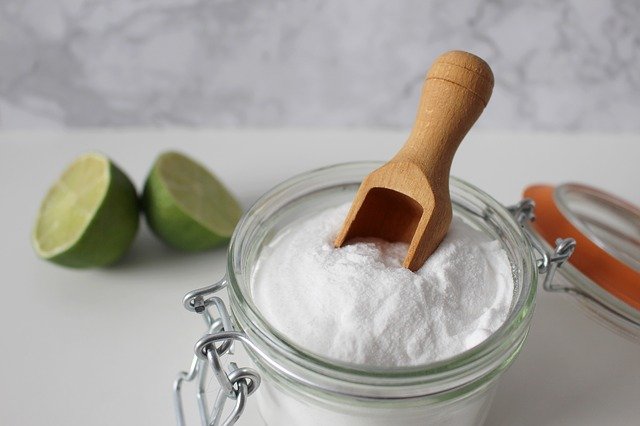
In general, cats are fastidious self-groomers and do not need too much bathing.
In fact, vets recommend not to bathe cats unless their coats are matted, sticky, grimy, dirty, or if they have fleas and ticks.
If you have run out cat shampoo, then the following alternatives can work well: (Please note – I strongly urge you to buy a high-quality cat shampoo like this one and not use anything else to bathe your cat.)
A. Baking soda
Baking soda is an all-natural and mild coat cleanser. You can use it in place of cat shampoo to bathe your pet.
Simply use half a cup of fresh baking soda like No products found. and mix it with water.
Pour the solution all over your cat’s body. Let sit for a few minutes before rinsing thoroughly.
B. Castile soap
Castile soap is a mild cleanser and it is also natural. It soothes inflammation, nourishes the skin, and even reduces itching, eczema, and dryness.
The best part is that castile soap is gentle enough for cats with sensitive skin as well.
C. Diluted vinegar
You can also use diluted vinegar to deodorize and clean your cat’s coat in lieu of cat shampoo.
Both apple cider vinegar and distilled white vinegar are fine – just make sure you dilute them. Pour the diluted solution over your cat’s wet coat and let stand for a few minutes before rinsing off.
D. Baby shampoo or baby wash
Yes, most baby shampoo and baby washes are pH neutral – this means that they have the consistency and neutral pH of water (7). These are safe to bathe a cat or kitten if you have run out of cat shampoo.
How to Make Homemade Cat Shampoo to Bathe Your Cat?
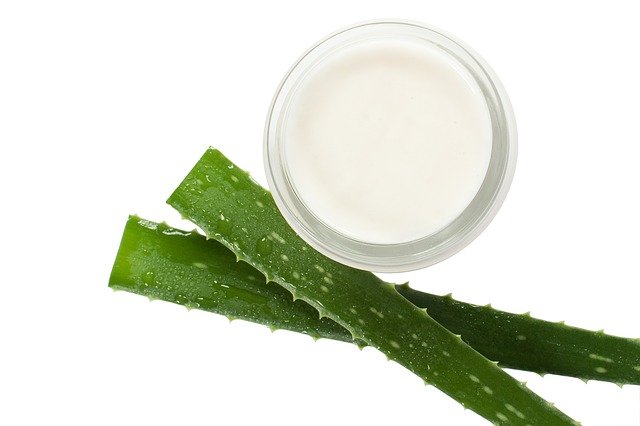
Avoid using regular shampoo or even dog shampoo to bathe your cat.
If you have run out of cat shampoo, then stick to the following pet shampoo recipe which is made using ingredients you can easily find in your kitchen:
- 1 cup white vinegar or apple cider vinegar
- 2 cups water
- 1/2 cup aloe vera gel
- 1 cup natural liquid dish soap
- 1-2 drops of lavender essential oil (optional)
Mix all the ingredients in a clean bottle. Wet your cat’s coat with water and then lather the above homemade cat shampoo all over. Let stand for a few minutes before rinsing clean.
Some More Tips for Successfully Bathing your Cat
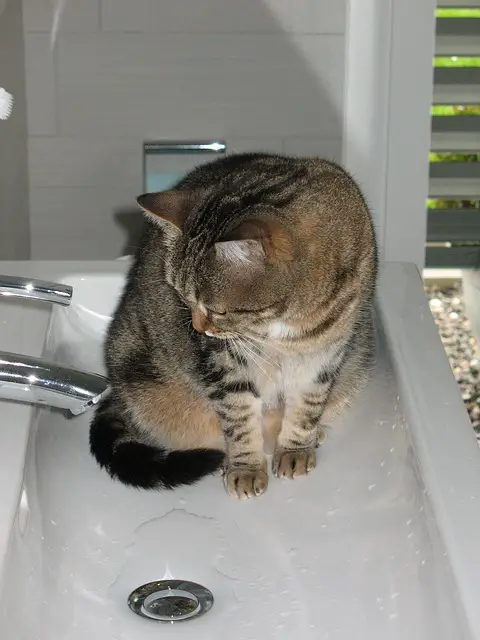
Cats do not need frequent bathing and most cats hate getting their fur wet. But every once in a while, cats tend to get their coats messy.
Here are some tips to help your cat get a shinier coat post-bathing:
1. Brush your pet before bathing
Brushing loosens mats and tangles and also eliminates stray hairs. This can help prevent clogged drains and make the bathing experience a lot smoother as well.
Have a long-haired cat? Check out this guide on the best brushes for them. For short-haired cats, see this guide.
2. Trim its toenails
Bathing is a good time to cut your cat’s toenails. Use high-quality pet clippers for the job.
3. Provide some traction
Cats don’t like slippery bathtubs and floors. So provide some traction so your pet can stand firmly and not slip while you bathe it. A rubber bath mat or a folded towel can do the job.
4. Time it right
Cats can get very fussy during bath time if they are tired or hungry. Try to schedule the bath after their nap time and in between meals when they aren’t too hungry. Don’t forget to reward and praise your cat afterwards for good behavior!
FAQs on Can I Use Human Shampoo on My Cat?
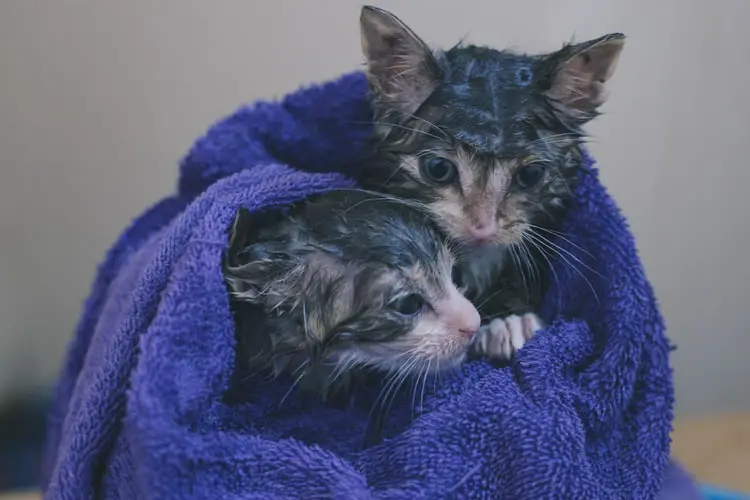
1. Can I use human conditioner on my cat?
Never use human conditioner on cats. Cats are self-groomers and many human conditioners tend to leave a sticky residue behind. This can be harmful if your cat ingests it.
2. Can I use Dawn dish soap on cats?
Yes, Dawn dish soap is a safe alternative to cat shampoo and it is known to eliminate fleas and ticks.
However, in excess, Dawn dish soap and other dishwashing soaps can cause dry skin in cats. That is why you must not make it a regular thing and instead, use a high-quality cat shampoo to bathe your pet.
3. Can I use Head and Shoulders® on cat?
No. Head And Shoulders® is formulated for treating dandruff in humans.
It is not pH-balanced for your cat’s skin, and resultantly, could be too harsh on its delicate skin. It could even cause dryness, itching, and flaking. Moreover, its strong scent can be irritating to cats.
4. Can I use waterless shampoo to clean my cat?
Waterless shampoo (also called dry shampoo) only deodorizes your cat. It won’t clean or remove grime and dirt from your cat’s coat.
However, dry shampoo for cats can be a good option between baths to keep your feline friend smelling fresh and clean.
Conclusion – Can I Use Human Shampoo on My Cat
No, please avoid the use of human shampoo for bathing cats because they can be very harsh and could dry out your pet’s skin.
In certain long-haired cat breeds like Maine Coon and Persian cats, human shampoos could cause irreversible damage including severe itching, dull and dry coat, and extensive hair fall.
If you have run out of cat shampoo, please use baking soda or baby shampoo to clean your cat.
Remember – most cats don’t need frequent baths so you can always wait until you get a chance to stock up on your cat shampoo.
